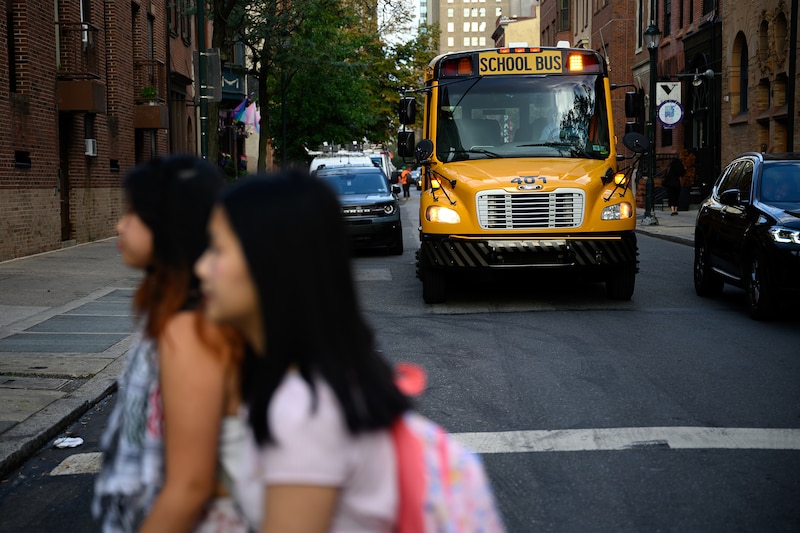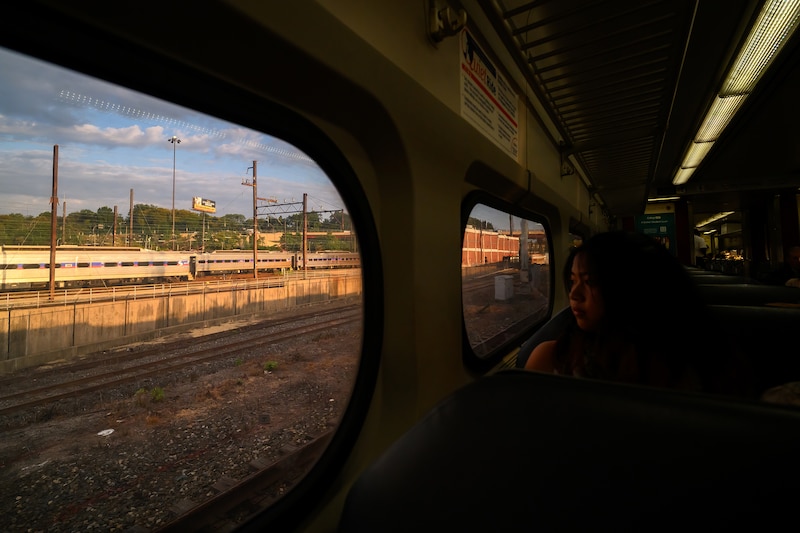Join Chalkbeat Philadelphia’s free publication to maintain up with town’s public college system.
Philadelphia highschool seniors Aster Chau and Joey Zhou caught to a routine for the final 12 months to make their greater than an hour-long commute to highschool on SEPTA extra bearable.
Every morning, they might discover one another on board the practice that goes from close to their houses far northeast from town heart to Academy at Palumbo almost 17 miles away in South Philly. “That’s how our friendship bloomed and blossomed,” Chau mentioned.
However within the early morning hours of the primary day of faculty this 12 months, they every braced for a commute that had, in a single day, gotten trickier. Their practice was about to come back much less often. Their bus can be overcrowded. And the entire commute was about to be much less dependable.
“In the event you’re going to be late, you’re like two hours late, after which there’s simply nothing you are able to do about it,” Zhou mentioned Monday.
This 12 months’s first day of faculty for Chau, Zhou, and Philadelphia’s almost 118,000 district college students got here sooner or later after the area’s public transit system started implementing 20% service cuts resulting from a funding disaster that state lawmakers haven’t addressed.
Transit officers have mentioned for weeks that they anticipated the cuts to go away college students and educators who depend on SEPTA with longer and extra crowded commutes.
However the college district has not stepped in with another or a plan. Although the district offers bus transportation to elementary college college students and college students with disabilities, most center and highschool college students are anticipated to take SEPTA if they should commute to highschool.
At a college board assembly final week, Superintendent Tony Watlington informed mother and father and college students to “Google SEPTA cuts” to seek out details about routes and to name their principal with any considerations. He additionally beneficial mother and father apply for the district’s program that might reimburse them for driving eligible kids to and from college, though that’s largely reserved for elementary college college students.
Deputy Superintendent Oz Hill later despatched a message to folks saying that the district understands that the service cuts might current a hardship to workers and households.
“Hundreds of scholars and a whole bunch of staff journey SEPTA to highschool and work daily,” Hill mentioned. “As a District, we hope that SEPTA receives satisfactory funding to revive full service.”
However for Philly college students and educators, that hope offers little aid. Chau and Zhou mentioned together with faculty functions and getting by AP lessons, they’re getting ready to shoulder extra transit stress this 12 months too.
“It’s simply very irritating at instances,” mentioned Chau. “There’s already lots occurring in our lives, and to have to fret about getting to highschool on prime of that’s, like, pushing it.”
Households worry transit cuts will make college students late
Chalkbeat requested college students and educators throughout town about how the SEPTA cuts have been affecting them, and heard from dozens of scholars and oldsters who shared considerations about lacking class, dropping extracurricular alternatives, and disincentivizing youngsters from going to highschool within the first place.
“I’m truthfully apprehensive about how I’m going to have the ability to get to highschool,” mentioned Nevaeh Martin, 17, a senior at Central Excessive College.
Normally, Martin’s commute from North Philadelphia takes round 45 minutes — so long as the 54 bus that comes close to her home arrives on time. However even earlier than the cuts, the bus was unpredictable. Generally, she must stroll for half-hour to get to the practice station.
Now, like most bus routes within the metropolis, the 54’s service has been decreased by 20%. Martin mentioned that makes her apprehensive that the 6:50 a.m. bus she often catches may not present up in any respect.
“If that bus doesn’t come, or a bus earlier doesn’t come, then mainly I’ll be late to highschool,” she mentioned.

Northeast Philadelphia, the place there may be restricted public transportation to start with, has been hit hardest by the transit cuts. Many college students in these neighborhoods who take SEPTA to highschool should stroll additional, wait longer, or discover another solution to get to highschool.
Ella Nguyen, 17, who attends Northeast Excessive College, mentioned she often takes the bus that goes close to her home to highschool. However now, she’s engaged on getting her driver’s license so she will borrow considered one of her member of the family’s automobiles to get to highschool.
“I actually didn’t wish to drive, as a result of I didn’t see a objective to it since I relied on SEPTA,” Nguyen mentioned. “However now it’s like, I actually hate taking crowded buses. I’m like, wow, I ought to actually learn to drive for this.”
Nonetheless, for a lot of college students, there’s no various out there.
Standing on the platform at Philmont regional rail cease on Monday morning, Chau waved hi there to different college students readying for his or her commute to the primary day of faculty. Although many, together with Chau, get a journey to the station, they have to make their very own manner into town for college.

When the practice pulled into the station simply earlier than 7 a.m., it was already full of commuters. College students discovered empty seats within the quiet automotive, the place their chatter was shortly shushed by adults using the practice to work.
Zhou bought on on the subsequent cease and slid in subsequent to Chau. They whispered and used their telephones for the remainder of the 30-minute journey to the Jefferson practice station. There, they tried to catch the 45 bus, however it pulled away proper as they bought out onto the road. That meant they needed to stroll the ultimate mile to highschool.
“We dread it,” mentioned Zhou, including that she bought dinged for being late numerous instances final 12 months as a result of the bus would go them.
However Chau mentioned she doesn’t thoughts the stroll, particularly in contrast with making an attempt to squeeze onto a crowded bus. And this manner, the youngsters get to hang around a bit longer earlier than the college day begins.
Academics say the district has not supplied steerage
Although the SEPTA cuts have loomed for weeks, a number of lecturers Chalkbeat spoke with mentioned they apprehensive the district had no thorough plan in place to assist college students and educators navigate transportation delays on the primary day of faculty.
“I obtained no communication as a instructor from the district in regards to the potential of SEPTA cuts and the way that may have an effect on attendance and tardiness,” mentioned Cady Zuvich, a second grade instructor at Ziegler Elementary College.
Zuvich mentioned she apprehensive for college kids she knew who had graduated and have been beginning center college this 12 months, a lot of whom must constantly take SEPTA to highschool for the primary time. A few of these college students could anticipate a bus to point out up that was a part of the cuts, leaving them ready and confused, she mentioned.
Zuvich mentioned she had considerations about her personal commute too. Like many Philadelphia lecturers, she takes SEPTA to get to work. However delays have already made her late prior to now. She mentioned the additional cuts would doubtless make these issues much more frequent.
Thomas Quinn, who teaches civics at Central Excessive College, mentioned he worries the transit cuts will exacerbate inequities within the metropolis, and make it much more tough for households who reside in underserved neighborhoods to get to highschool.
He mentioned he plans to make use of SEPTA’s transit funding disaster as a educating second, to elucidate to college students how authorities motion — and inaction — impacts their on a regular basis lives.
“It’s one thing we simply want to verify we’re talking up about, serving to college students perceive the stakes and the way this got here to be,” mentioned Quinn. “After which ensure that they vote in November.”
Christina Puntel, a Spanish instructor at Walter B. Saul Excessive College, mentioned she wished college officers had been extra proactive in offering sources and options to households who depend on SEPTA.
“I feel if the district spent a minute listening to folks and youngsters, then we’d have no less than some tenable manner by this,” Puntel mentioned.
As for Chau and Zhou, the scholars hope their lecturers will probably be understanding this 12 months when SEPTA makes them late. However greater than that, they hope the transit system will enhance and get the funding it must reverse the cuts.
Subsequent week, when the total extent of the primary spherical of SEPTA cuts kick in and regional rail schedules change, the one practice that can get them to highschool on time will depart at 6:24 a.m. — half an hour sooner than their already-early morning commute.
“I simply really feel like SEPTA is so vital to everyone in Philly, however particularly for college kids,” mentioned Zhou. “It’s simply going to make the whole lot tougher.”
Rebecca Redelmeier is a reporter at Chalkbeat Philadelphia. She writes about public faculties, early childhood training, and points that impression college students, households, and educators throughout Philadelphia. Contact Rebecca at rredelmeier@chalkbeat.org.

